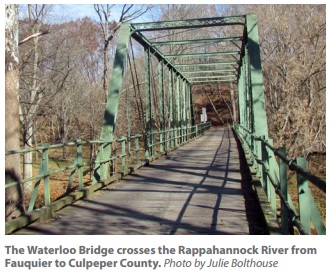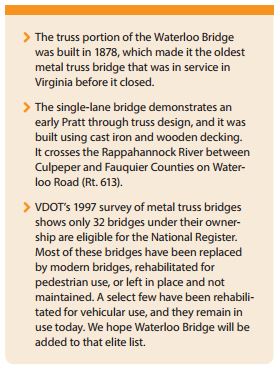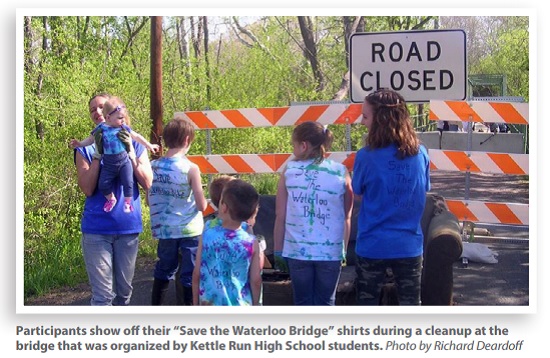
In January, VDOT closed the bridge, which up until that point, had been estimated to carry approximately 840 vehicles per day. By this time, Kettle Run High School students, with the assistance of history and government teacher Mr. Richard Deardoff, started a Save the Waterloo Bridge Facebook page to share the structure’s history, their personal stories and photographs, and express their strong desire for its preservation. The page now has over 2,650 followers, and the number continues to grow.
“If we continue to bulldoze, pave over, replace every part of our past, what legacy and ethic will we leave to our children,” asked Mr. Deardoff.
We couldn’t agree more. So this March, PEC sent out letters to residents within a two-mile radius encouraging them to contact their supervisors and sign a petition requesting that the Counties and VDOT keep the bridge open for residents and visitors to enjoy during their travels. The petition was shared in local stores, in news articles, on the Save the Waterloo Bridge Facebook page and on bridgehunter.com, and now has over 800 signatures.
If you haven’t signed the petition yet, visit www.pecva.org/waterloobridge!
 As the community’s support continued to grow for the structure’s full rehabilitation, we reached out to Preservation Virginia, which placed the bridge on their list of Most Endangered Sites for 2014. What may further help the bridge’s chance at rehabilitation is its eligibility for the National Register of Historic Places, which means it is entitled to close scrutiny during any process to permanently close it or make significant changes to the structure.
As the community’s support continued to grow for the structure’s full rehabilitation, we reached out to Preservation Virginia, which placed the bridge on their list of Most Endangered Sites for 2014. What may further help the bridge’s chance at rehabilitation is its eligibility for the National Register of Historic Places, which means it is entitled to close scrutiny during any process to permanently close it or make significant changes to the structure.
Backed by a coalition of partners such as Mosby Heritage Area Association, Goose Creek Association, Remington Community Partnership, Citizens for Fauquier County and Unicorn Winery in Amissville, PEC also submitted a coalition letter to the Fauquier Board of Supervisors, which requested the Fauquier and Culpeper Board of Supervisors and VDOT rehabilitate the unique historic bridge for vehicular travel.
VDOT and the Board of Supervisors are now considering the bridge’s rehabilitation, but demolitionis not off the table. The cost of each potential option is being weighed at this time.
Why Rehabilitation?
PEC and a coalition of local organizations believe that the bridge should be rehabilitated for continued vehicle traffic, and here’s why:
- The bridge is a coveted historic resource in Virginia. Residents and visitors take Waterloo Road,which for some is a slightly longer route to their destination, just so they can drive over the bridge and enjoy its historical nature and beautiful atmosphere.
- Moving the bridge to some other site would take it out of its historical context. Both the bridgeand the area are historically significant together, and they should stay connected.
- Replacing it with a new bridge destroys the historical nature of the resource and could potentially cost more than rehabilitating the current bridge.
- The option of rehabilitation for pedestrian and bicycle traffic is impractical given the bridge’sremote location, lack of public parking for visitors, and its disconnection from established bicycle routes. Plus, there are still significant costs associated with this option.
Fauquier County previously lost a historic bridge over the Rappahannock River at Kelly’s Ford. And the railroad bridge over the river in Remington is also currently being threatened. The Waterloo Bridge is a unique distinguishing feature that contributes to the identity of rural Fauquier and Culpeper County.
“It’s part of the heritage and character of this area that sets us apart from the monotony of suburbia,” said Rebecca Bongiovi, student at Kettle Run High School.

Add your voice to those advocating for saving this valuable historic bridge by following the Facebook page, signing our petition and contacting the Board of Supervisors in Culpeper and Fauquier!
For more information please check out www.pecva.org/waterloobridge, or contact Julie Bolthouse at [email protected].
This article was featured in our Summer 2014 Member Newsletter, The Piedmont View.
